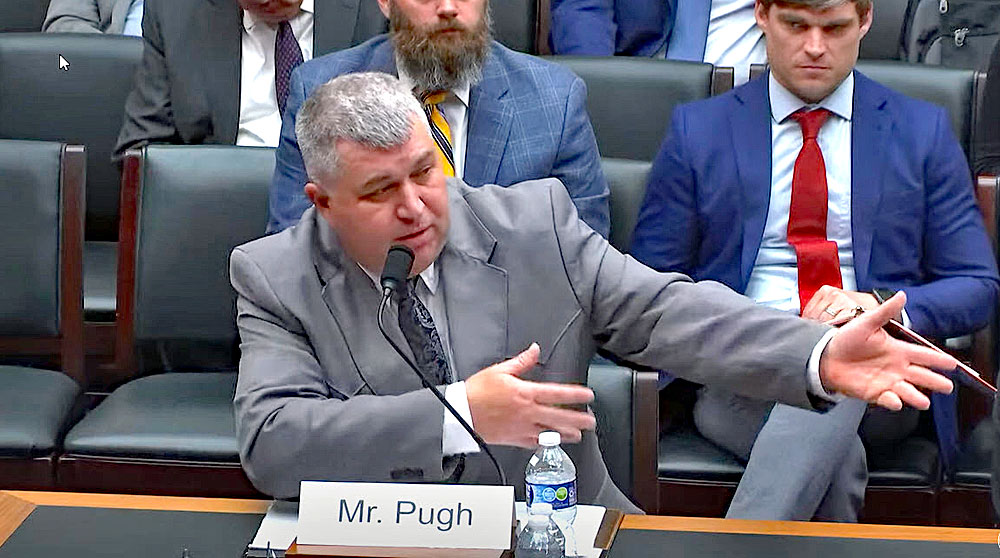Want to fix the supply chain? Listen to truckers
As part of a hearing aimed at improving the supply chain, OOIDA Executive Vice President Lewie Pugh asked lawmakers to consider the challenges truck drivers face.
Truck drivers often work in an environment where they are unable to find a safe place to park or somewhere to use the restroom. And because truck drivers are typically paid by the mile and are exempt from overtime pay, it’s common for them to spend hours of uncompensated time each day waiting to be loaded or unloaded.
Pugh asked members of Congress how anyone could be expected to operate efficiently and safely under those conditions.
“I’d like to see you and your colleagues try to get your work done if you didn’t have a safe place to sleep at night,” Pugh said. “Then you arrive at your offices at 9 a.m., but you are forced to wait until the early afternoon to begin working, while not being allowed to use the restroom and not being paid for the time you have wasted all morning.
“If you really listen to what truckers have been trying to tell you, it isn’t hard to see why supply chain performance is lacking.”
Pugh testified at a House Highways and Transit Subcommittee hearing on Wednesday, May 10. The hearing titled “Freight Forward: Overcoming Supply Chain Challenges to Deliver for America” aimed to identify legislative solutions.
Lawmakers should start by improving the profession for truck drivers, Pugh said.
“It is clear to OOIDA the supply chain will never function optimally when our members struggle to find safe parking, are detained at loading facilities for hours on end, aren’t being fully paid for the time they work, face a flood of new and costly regulations and can’t even access restrooms when picking up or dropping off critical freight,” Pugh wrote in his submitted testimony. “If you want to improve supply chain functionality through legislation, you must find the political courage to address these pervasive problems.”
Pro-trucker bills
Pugh touted bills for truck parking, restroom access and overtime pay.
OOIDA helped craft the Truck Parking Safety Improvement Act, which would provide $755 million for truck parking over three years.
Last congressional session, OOIDA also worked with lawmakers to introduce the Truckers Bathroom Access Act and the Guaranteeing Overtime for Truckers Act. The first bill would require shippers and receivers with restrooms to make them accessible for truckers while loading or unloading. The second bill would remove the overtime wages exemption for truckers. Both measures are expected to be reintroduced soon.
Rep. Mike Bost, R-Ill, who introduced HR2367, used much of his time to discuss the lack of truck parking and the importance of providing truck drivers an adequate place to sleep at night.
“Truckers need their rest and deserve their rest,” Pugh said.

Rep. Troy Nehls, R-Texas, who introduced the restroom bill, spoke out against opponents of measures to make sure truck drivers have a place to use a restroom.
“I just want to put on the record to all the lobbyists and trade associations that are trying to sink this bill, ‘I really don’t care what you think on this issue,” Nehls said. “Just imagine if Congress banned lobbyists from using restrooms as you wait outside these committee rooms or offices. Imagine if you were told – all you lobbyists – ‘go outside and find a tree. Hell, go find a fire hydrant. Go outside and relieve yourself because we’re not going to let you do it in here.’ How long do you think that would last? What do we want to do, treat our truckers likes cats and dogs?
Shame on those lobbyists and trade associations who are trying to sink this bill. I believe it’s the right thing to do.”
Blocking mandates
Pugh also used a portion of his testimony asking Congress to block such burdensome mandates as speed limiters, which OOIDA believes would actually deter safety.
“Both ATA and FMCSA are aware that decades of research on the topic of speed has consistently led to the same conclusion: roads are safest when all vehicles are moving the same relative rate of speed,” Pugh wrote. “ATA has chosen to ignore this reality because a speed limiter mandate would benefit their large, corporate members by slowing down smaller competitors.”
OOIDA supports the DRIVE Act, which would prevent FMCSA from moving forward with a speed limiter mandate. LL









